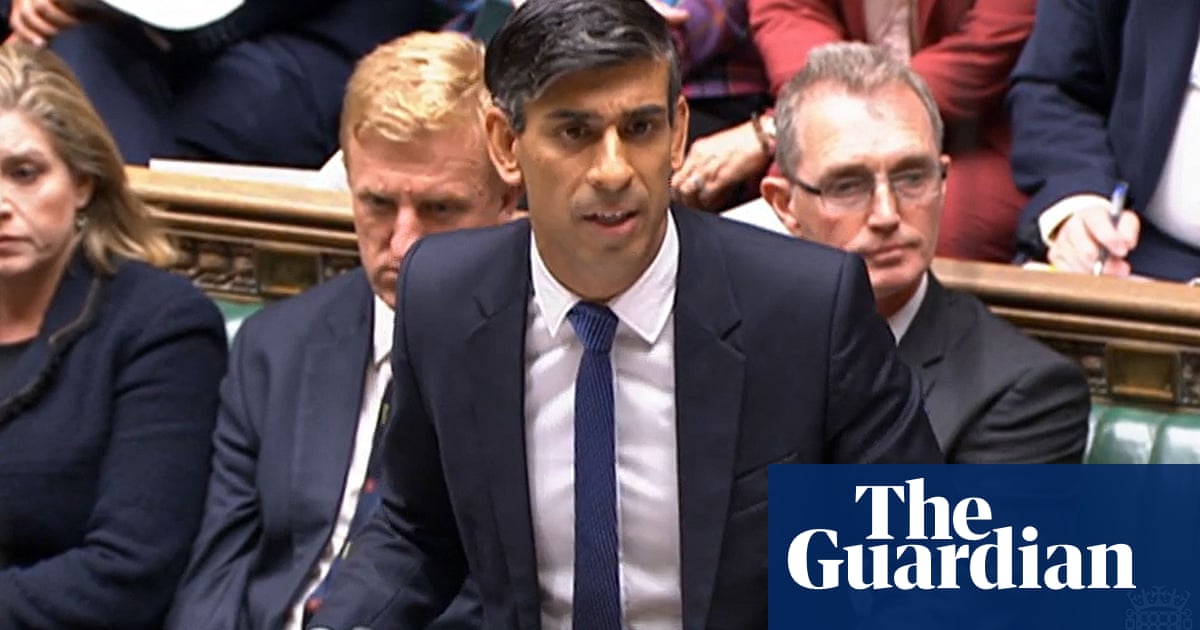
Rishi Sunak is facing a rebellion of about 50 MPs who are demanding an end to housebuilding targets for councils, via an amendment which campaigners say would further hinder affordable homes.
The amendment, led by the former cabinet minister Theresa Villiers, has backing from 46 MPs who have signed the bid to scrap mandatory local housing targets and make them advisory only.
The government is now set to pull the vote on the bill on Monday amid a standoff with rebels and promising further engagement on their concerns, though officially ministers say the vote has been delayed because of time pressures from the finance bill.
The move is backed by a number of former cabinet ministers, including Damian Green, Esther McVey, Priti Patel, Chris Grayling and Iain Duncan Smith. Other prominent MPs who have signed up include Tracey Crouch, Treasury select committee chair Harriett Baldwin, foreign affairs committee chair Alicia Kearns and Maria Miller.
The amendment would also abolish the five-year land supply rule, which determines whether there have been enough sites are allocated for development to provide five years’ worth of housing. If not, developers can submit applications for land that has not been allocated for housebuilding.
MPs have been emboldened after both Sunak and his predecessor Liz Truss said they would relax rules on housebuilding during the Conservative leadership contest.
Truss said she would end “Whitehall-inspired Stalinist housing targets” and Sunak promised to relax the five-year rule and also stop local authorities requesting changes to greenbelt boundaries.
Robert Colvile, the director of the CPS thinktank, said it was “selfish and wicked” for MPs to attempt to scrap the targets and that the proposals could cut the number of homes being built by 20% to 40%, potentially more because the industry was already being affected by recession and interest rate rises.
“The actual effect would be to enshrine nimbyism as the governing principle of British society – to snap the levers that force councils to build, and leave every proposed development at the mercy of the propertied and privileged,” he wrote in the Times.
The former levelling up secretary Simon Clarke also said he was alarmed by the amendment. “There is no question that this amendment would be very wrong. I understand totally how inappropriate development has poisoned the debate on new homes in constituencies like Chipping Barnet [Villiers’ constituency], but I do not believe the abandonment of all housing targets is the right response,” he tweeted.
“We also need to recognise the fundamental inter-generational unfairness we will be worsening and perpetuating if we wreck what are already too low levels of housebuilding in this country. Economically and socially it would be disastrous. Politically it would be insane.”
Labour will not back the amendment, the Guardian understands, but the size of the rebellion could leave the government dependent on Labour votes in order to block it.
Green wrote on ConservativeHome defending the amendment that the aim was to “take power away from central government planners and distribute it to local people”.
He said the current rules were not incentivising housebuilding but instead made landbanking by developers more profitable. “Instead of blaming councils, we should look at the failure of the current regime to incentivise developers to build once they have received permission,” he said.
“A central target cannot recognise the different pressures in different parts of the country. National averages for house prices are meaningless in the real world because the same house will be many times the price on the outskirts of Sevenoaks as the outskirts of Sunderland.
“This is precisely why we need local decisions, expressed in local plans, about the scale of development needed in each area.”
Lisa Nandy, the shadow housing secretary, said: “This is a complete shambles. The government cannot govern, the levelling up agenda is collapsing and the housing market is broken. Pulling flagship legislation because you’re running scared of your own backbenchers is no way to govern.
“There is a case for reviewing how housing targets are calculated and how they can be challenged when disputed, but it is completely irresponsible to propose scrapping them without a viable alternative in the middle of a housing crisis.
“Labour will step up to keep this legislation moving. There is too much at stake for communities that have already been victims of Tory chaos and of a prime minister too weak to stand up to his own party.”












